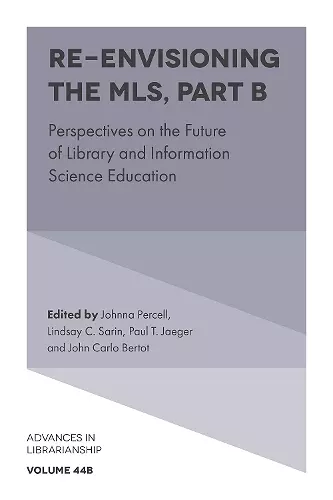Re-envisioning the MLS
Perspectives on the Future of Library and Information Science Education
John Carlo Bertot editor Paul T Jaeger editor Lindsay C Sarin editor Johnna Percell editor
Format:Hardback
Publisher:Emerald Publishing Limited
Published:13th Apr '18
Should be back in stock very soon

At the heart of any discussion about the future of libraries is the future of librarians—and how well our instructional programs, especially the Master of Library Science (MLS) degree, prepare them for their careers. Building on the Re-envisioning the MLS initiative from the University of Maryland’s iSchool and the Information Policy & Access Center (iPAC), this book continues the critical conversations around preparing future librarians.
Library and information science (LIS) programs are the foundation of librarianship, and their design requires input from everyone in the field—from academics designing programs and courses, to practitioners reflecting on how prepared (or unprepared) they are to serve their communities, to hiring authorities considering qualifications of candidates.
The second installment of this two-part volume explores many of the challenges and opportunities inherent in the future of the MLS degree, including
- the changing nature of the communities that libraries serve and how LIS education should address these changes,
- how archival training must accommodate big data,
- the specialized skill sets librarians need on the job, and
- how best to prepare librarians for their role as educators.
In this second volume of a two volume-set, library professionals, administrators, researchers, and educators from North America and the UK present 12 chapters on innovative approaches to library and information science (LIS) education, focusing on issues of diversity, inclusion, and equity; the education roles of library and information science professionals; the incorporation of new technologies and related pedagogical approaches into the curriculum; the opportunities presented by social work to expand LIS education; and the new relevance of traditional elements of the Master of Library Science. They address how the library profession can develop and deliver library services that target the opportunity gap in the US, opportunities for diversity-related content and the integration of critical race theory in the curriculum, the role of the MLIS program in preparing culturally competent school librarians who can provide services and programs that include LGBT students, how social work can contribute to the education of LIS practitioners, how graduate programs can integrate the interests of educators with those of the profession and public using an apprenticeship model, moving beyond tech-savvy librarians to those embedded in and helping create content and technology, creating a new paradigm in archival practice called computational archive science, cataloging in the curriculum, and issues around MLIS graduates as educators. -- Annotation ©2018 * (protoview.com) *
ISBN: 9781787548855
Dimensions: unknown
Weight: 485g
264 pages